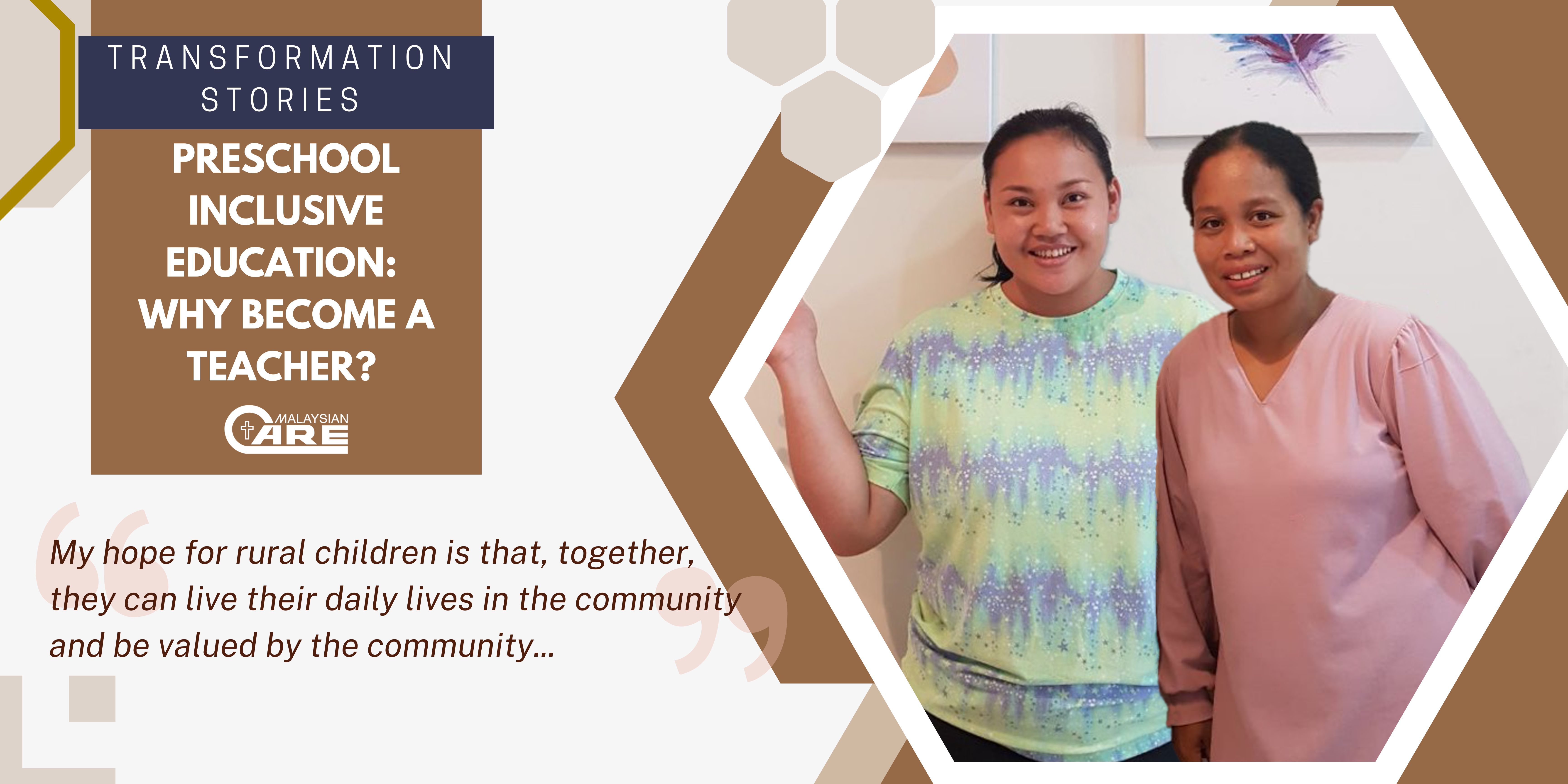
Preschool Inclusive Education: Why Become A Teacher?
Malaysian CARE, through its Preschool Inclusive Education (PIE) program, have been providing ongoing support services working to educators from rural areas by empowering them with the knowledge to create a more inclusive learning environment. Through effective teaching and appropriate resources, these educators are able to provide children with more opportunities to achieve their full potential. We journey with the teachers to better understand their roles and purpose as teachers, whilst gaining a better understanding of what they value in life and support them in their ministries despite the challenges.
“This boy is very naughty… climbs the table… we gave him instructions (but) he didn't listen!”
“Sorry we do not accept children with learning disabilities, there are no services here…”
“We teachers don't handle kids like this…”
“How can we tell the parents of this student that we are not accepting this boy in class? We cannot tahan (tolerate) already…”
***
Sounds familiar? These are some of the responses we frequently hear from teachers we meet in the rural areas.
When we spoke to them, they shared that some children, especially those from low income families, were often left at home. The parents felt disempowered as they had few resources, ideas and information to make decisions on their child’s future, education or accessing therapy due to cost and logistical issues.
These teachers are committed to teach regardless if they had been appointed or assigned by their schools or churches, some are even called to teach without payment or allowances. Their calling is to educate, although they may differ in motivation, circumstances, experiences and confidence in teaching.
Teacher Amellisa shared that her motivation is “…to help children acquire knowledge”, while Teacher Inantangan shared how she felt called to serve as a teacher as part of her church’s mission. She felt that her experience as a Sunday School teacher placed a burden on her heart to help the children in rural areas who were left behind.
“Anyone can be a teacher, but not everyone can influence you to strive for excellence and make a difference in the world around you.”
The financial resources of community learning centres or private educational institutions in rural areas differs greatly compared to the urban areas. Many teachers in the rural areas sacrifice their allowances to help meet the needs of the children in their schools. They work hard to help the children realise their parents’ hopes for them to be educated academically and spiritually.
In a recent survey done on the stigma of education against children with disabilities in the classrooms, we received the following feedback from teachers:
● “It is quite difficult to handle a special needs child because I do not have the knowledge on how to deal with this child.”
● “ Parents or guardians should bring the student to a specialist for advice, including the appropriate special education school for the student.”
● "Separate seating from normal students, in case OKU (orang kurang upaya) students (with disabilities) injure themselves or other students. My students will be segregated from them."
Anyone can be a teacher but not everyone can teach passionately
“Every child deserves a champion: an adult who will never give up on them, who understands the power of connection and insists they become the best they can be.” - Rita Pierson, Educator
Teacher Inantangan Holabo shared:
“The mission to be a Christian teacher is a calling from God to continue to serve children, regardless of whether they have special needs or otherwise. Thank you, Lord Jesus, for always giving me strength mentally and physically.
The challenge to implement Inclusive Education in rural areas is people’s mindset which does not appreciate the value of Inclusive Kindergarten’s as it not well understood by many.… although the inclusive value is already starting to spread all over the surrounding area in my village.
My hope for rural children is that, together, they can live their daily lives in the community and be valued by the community for what they can achieve through inclusive education themselves. To me, whatever their life situation is, they are just like everyone else, like me, because we are all God’s precious creation.”
Written by Joanna Andereas, Community Development Leader, Pusat CARE Kota Kinabalu